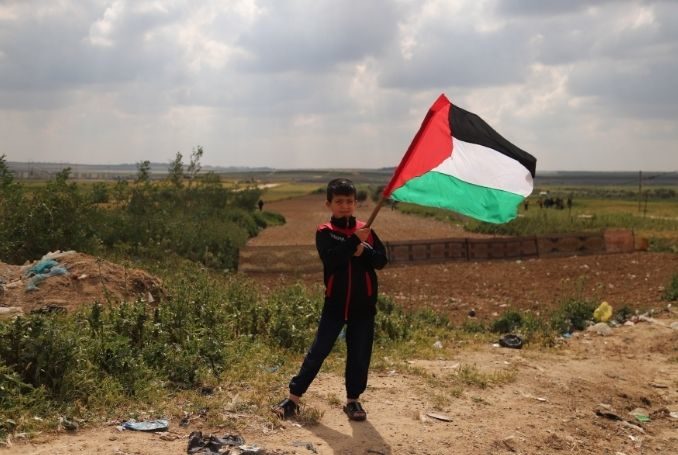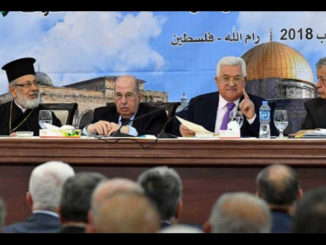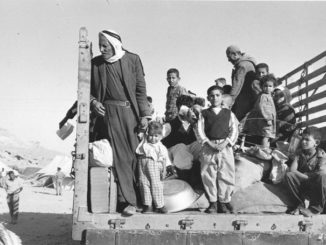
By Benay Blend
“In 2019 I went to Palestine twice,” wrote Ibtisam Barakat, “one time with Palestine Festival of literature in April.” When an officer informed her at the border that she didn’t exist in Israeli records, Barakat started to cry. She “cried for two weeks nonstop. Nothing and no one could stop [her], not even a delicious falafel sandwich.” All that time, recalled the Palestinian-American poet, she “ate falafel and cried.”
On Land Day 2021, Barakat’s words are more relevant than ever. Forty-five years ago, on March 30, 1976, Israeli police murdered six Palestinian protestors as they were calling attention to the Israeli government’s expropriation of thousands of dunums of Palestinian land. Since then, notes Yara Hawari, March 30 has been commemorated as Land Day.
An important “event in the Palestinian collective narrative,” explains Hawari, it incorporates resistance to colonization, in particular “colonial policies of erasure,” efforts by Israelis to erase all Indigenous presence on the land. Indeed, since 1948, Palestinians have defied those policies with characteristic sumud (resilience), both by holding fast to a collective narrative that incorporates individual perspectives.
When Barakat returned to Palestine, an officer asked why she was coming back a second time in one year. At the time, she had no idea how to reply. “Now,” she explains, she knows “the world was going to change and the universe knew that I needed to see Palestine twice in a year” before it became impossible. “Seeing my Palestine or not seeing my Palestine is a spiritual experience for me,” she says, thereby calling attention to her individual refusal to be erased that is in turn part of a collective experience.
On March 30, 2018, Palestinians in Gaza began a series of weekly demonstrations that would last for months, resulting in a staggering number of deaths and injuries from Israeli snipers that drew the attention of the media. What did not get covered so much were the cultural aspects of the rallies—storytelling, cooking traditional dishes, performing dabke, and even weddings took place—thereby passing down traditions to a younger generation.
“What is largely missing from the discussion on Gaza is the collective psychology behind this kind of mobilization,” writes Ramzy Baroud, “and why it is essential for hundreds of thousands of besieged people to rediscover their power and understand their true position, not as hapless victims, but as agents of change in their society.”
In the same way that Barkat worked through her grief at being told of her non-existence, so Palestinians on a collective scale have maintained a narrative that resists the official story. As Baroud explains,
“For 70 years, Palestinians have embarked on that journey of recreation of the self. They have resisted, and their resistance in all of its forms has molded a sense of collective unity, despite the numerous divisions that were erected among the people. The Great March of Return is the latest manifestation of the ongoing Palestinian resistance.”
Two years later, in 2020, the spread of Coronavirus added to ongoing problems. In order to provide a safe space to commemorate the day, Samidoun: Palestinian Solidarity Network issued a virtual call to action:
“Mark Palestine Land Day (Yawm Al-Ard), a day of remembrance for six Palestinian citizens who were murdered by Israelis while protesting the Israeli government’s expropriation of thousands of dunums of their land. March together online on the second anniversary of the Great March of Return.”
Thanks to donations from Russia and the UAE, Gaza recently initiated a vaccine program in an effort to confront the virus pandemic and break the cycle of deaths.
According to Hawari, Land Day commemorates ongoing resistance, but it also “reminds us how the domination of space is an integral aspect of the Zionist settler-colonial project.” Moreover, she points out, “settler-colonial states the world over are in a constant process of colonizing more and more indigenous land while squeezing indigenous peoples into as little space as possible.”
In order to steal more land, colonists in both Israel and North America developed the myth of the vacant land. For example, on March 8, 1969, Golda Meir reportedly asked: “How can we return the occupied territories? There is nobody to return them to.”
Propaganda around the Indigenous in North America sounds much the same. As Steven Salaita tweeted: “you’ll never understand Zionism without a concomitant understanding of Manifest Destiny,” a phrase devised in 1845 to explain that the United States was destined—by God, its advocates believed—to expand its territory across the entire North American continent.
“Of all myths associated with American Indians,” explains Dina Gilio-Whitaker (Colville Confederated Tribes), “no myth is as pervasive as the myth of the vanishing Indian.”
In my American history classes, there would invariably be the student who said that Native people no longer exist, despite the fact that just by looking around the classroom that student might have reached a different conclusion. Nevertheless, because dominant society has been “indoctrinated with the idea of the vanishing Native their whole lives,” Gilio-Whitaker asserts, “the assumption that there is no such thing as real Natives anymore is like a software program constantly running in the background.”
To these deniers, the “real Indians were the ones who dressed in buckskins and hunted buffalo and deer for their living, and didn’t speak English,” Gilio-Whitaker notes, and, in reality, they have “been gone a long time.”
Despite all of the efforts to deny their existence, which makes it all the easier to steal land and resources, both Palestinians and Indigenous people in the States are still around. The commemoration of Land Day attests to that, as do efforts on the part of Native Americans to make their presence known.
Quoting Gerald Vizenor, a citizen of the White Earth Nation, Roxanne Dunbar-Ortiz calls attention to his notion of “survivance”:
“Survivance is an active presence: it is not absence, deracination, or ethnographic oblivion, and survivance is the continuance of narratives, not a mere reaction, however pertinent. Survivance stories are renunciations of dominance, the unbearable sentiments of tragedy, and the legacy of victimry” (An Indigenous Peoples’ History of the United States, 2014, p. 217).
Decades after their displacement, the Palestinians long for a place, a homeland that could provide them with grounding to affirm that they exist. In the introduction to Nakba: Palestine, 1948 and The Claims of Memory (2007), Ahmad Sa’di and Lila Abu-Lughod write that “making memories public affirms identity, tames trauma, and asserts Palestinian political and moral claims to justice, redress, and the right to return” (p.2).
Memory, then, “continuance of narratives” as Vizenor calls it, serves as an expression of the need to officially exist. Manifested in events like Land Day, alternative histories affirm what happened in the past but also what should be done in the present to assure that all formerly oppressed peoples have a future.
– Benay Blend earned her doctorate in American Studies from the University of New Mexico. Her scholarly works include Douglas Vakoch and Sam Mickey, Eds. (2017), “’Neither Homeland Nor Exile are Words’: ‘Situated Knowledge’ in the Works of Palestinian and Native American Writers”. She contributed this article to The Palestine Chronicle.

– Benay Blend earned her doctorate in American Studies from the University of New Mexico. Her scholarly works include Douglas Vakoch and Sam Mickey, Eds. (2017), “’Neither Homeland Nor Exile are Words’: ‘Situated Knowledge’ in the Works of Palestinian and Native American Writers”. She contributed this article to The Palestine Chronicle.








